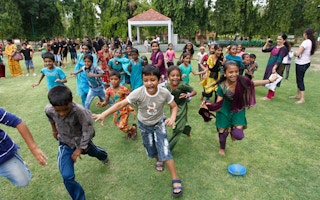Four organisations were honoured for their ideas from transportation to community engagement which solve urban challenges at a ceremony last night at the FT / Citi Ingenuity Awards held at Four Seasons Hotel in Singapore.
In its second year, the awards developed by Citi and the Financial Times recognise leaders who have developed breakthrough solutions to urban challenges that benefit cities, urban communities and citizens.
These four programmes - from India’s first intelligent transport system which addressed traffic congestion and increasing emissions to a Papua New Guinea programme that empowers impoverished women at risk of domestic violence - were selected from 180 entries across 44 countries.
They will go on to compete for the Asia Pacific award, one of five regional category awards, which will be announced together with a global winner in a ceremony this December.
Previously, the awards focused on different fields, such as education, energy, infrastructure and healthcare, as categories. This time, a geographic split was implemented to diversify entries, said Citi.
“
Solving urban challenges require courage, hard work, knowledge. We need to research and design the best ideas and best approaches, and have ingenuity of course
Liu Thai Ker, Centre for Liveable Cities chairman
Among the four Asia Pacific award contenders, three are from India, while the fourth is from Papua New Guinea, where the capital, Port Moresby, is considered to be one of the worst cities in the world, according to The Economist Intelligence Unit.
Digicel PNG Foundation, the corporate social responsibility organisation of a mobile network company in Papua New Guinea, is working towards improving the city. The foundation focuses on skills training for settlement dwellers, or those who escaped the impoverished village life only to meet a harsher social reality in the city.
Speaking to the Financial Times, Beatrice Mahuru, Digicel Foundation’s chief executive, said, “Many people from the settlements get sucked into crime because they don’t have jobs and there is no other way to put bread on the table, especially for those without a good education.”
Their programme initially started as a one-week discussion on violence against women, since the country has a strong patriarchal society, said Mahuru. This soon developed into the current life and business skills programme when locals asked for employment assistance to better their lives.
Similarly, India-based organisation Parinaam aids the disenfranchised in Bangalore, particularly women, through micro financing and training centred on job opportunities, financial literacy, healthcare and childcare.
“There are hundreds of NGOs that walk in [to slums] every day, and government officials promising this, promising that, but hardly ever delivering anything,” said founder Elaine Ghosh.
This is why she implemented a multidimensional approach, she explained. “You have to give them healthcare, you have to give them access to vocational training, you have to help the kids get into decent schools, and stay there, so that the parents won’t pull them out and send them to work.”
In another part of India, aProCh – which stands for ‘A Protagonist in every Child’ – plans to create the first child-friendly city in Ahmedabad, as well as open up more spaces for children’s use in other urban centres.
Kiran Bir Sethi, the group’s founder, has engaged the help of various sectors, from municipal authorities to other non-government organisations, to bring together kids of different socioeconomic backgrounds to enjoy recreational activities around the city.
One of their successful endeavours has been closing a main shopping street to vehicular traffic six times a year to conduct a street kiddie party.
The fourth finalist, CMC, has developed India’s first Intelligent Transport System in Mysore, providing commuters with real-time data through a global positioning satellite system. CMC has received funding from the World Bank and state government to scale up their system in other Indian cities.
Dr Liu Thai Ker, chairman of the Singapore-based Centre for Liveable Cities, who delivered the keynote speech on at the Ingenuity Dinner Forum on Tuesday evening, said: “Solving urban challenges require courage, hard work, knowledge. We need to research and design the best ideas and best approaches, and have ingenuity of course.”
“There are lots of hurdles to cross, but we have to be smart and also have to deliver our tasks well,” he added.
Tracey Woon, vice chairman of Asean Corporate and Investment Banking for Citi, said, “The decision to bring the 2013 FT / Citi Ingenuity Awards to Asia this year reinforces our commitment to the region.”
All contenders will be reviewed based on a criteria that includes originality, impact, efficiency and outcomes. All submissions will be judged by the Financial Times and INSEAD, as well as various experts relating to the focus of the projects.

















